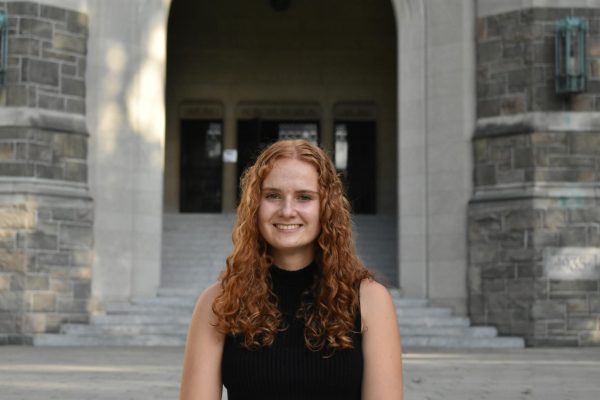Faculty Senate Prepares to Sue Fordham Over Retirement Benefits Freeze
Fordham’s Faculty Senate is soliciting contributions from faculty to cover legal fees as it builds a case against the university for suspending retirement contributions, according to two emails the Senate sent to faculty on Dec. 21 and Jan. 21.
In these emails, the Faculty Senate Executive Committee states that it is currently working with an attorney in order to pursue its goal of “returning to the negotiating table to achieve a mutually acceptable agreement with the trustees and administration.”
According to an email sent in late December, the decision to pursue a lawsuit against the university came after several proposals from the Senate to revisit negotiations over the retirement benefits freeze were rejected by the administration.
“Unfortunately, it still appears that the trustees and administration are not at this point willing to participate in negotiations concerning the University’s contributions to faculty retirement benefits,” the Executive Committee wrote. “It also appears that the trustees and administration believe they were acting within their rights in suspending those contributions. Our counsel is of the opinion that the executive committee of the Board of Trustees and the University are not within their rights to take a unilateral decision on this matter.
In a later email, sent to faculty on Jan. 21, the Executive Committee stated that negotiations had still not been resumed between the Faculty Senate and the university.
This controversy over the university’s decision to temporarily freeze its employee retirement fund matching program has persisted since it was first announced in October 2020 in an email to the Fordham community from Rev. Joseph M. McShane, S.J., president of the university, and Robert Daleo, the chair of the board of trustees.
In another email days later, McShane defended the measure, arguing that the retirement benefits freeze had been necessary after other efforts, including a salary and hiring freeze and early retirement offers to some staff, failed to completely close the remaining “multi-million-dollar” gap caused by the pandemic.
“The University had two hard alternatives from which to choose to close that gap: suspending the University’s retirement contribution for the last three quarters of the current fiscal year; or furloughing or laying off members of our faculty and staff,” McShane wrote. “We believed, and continue to believe, that the second option would fall disproportionately on the most vulnerable members of the University’s workforce.” McShane said the university felt the retirement benefits freeze presented the more “compassionate” choice.
In their email, McShane and Daleo said that the university intends to reinstate those benefits after June 30, 2021. “Even as it took this step, the Executive Committee expressed its firm hope/intention of restoring the money to the retirement plan when the University’s finances are back on solid footing after the crisis of the pandemic has passed,” they wrote.
At this time, the university has not expressly committed to a set term of repayment of benefits lost from November to the end of June.
At the end of January, a petition calling for “a complete reinstatement of faculty benefits” created by a group called Fordham Students Against Austerity resurfaced online. The group, founded by Sean de Ganon, FCLC ’22, originally posted the petition in November 2020 of last year. It was posted by the anonymously-run student Instagram account @letstalkaboutitfordham at the beginning of the spring semester and has subsequently reached more than 300 signatures.
“If the administration had a sense of the values they have been preaching, they would reverse these draconian cuts to the faculty who have been working very hard,” the petition states.
De Ganon said he felt the best way for students to share their opinions on the topic is through the petition. “I am hopeful that after a certain amount of signatures from students, the administration will address our concerns,” he said. “We want to get to 500 signatures before considering our next steps. But for the time being, signing the petition will be the best motive for students to voice their opinions,” said de Ganon.
Dr. Patricio Meneses, the president of the advocacy chapter of the American Association of University Professors at Fordham, said negotiations regarding faculty benefits and salaries routinely take place between university administration and the Faculty Senate. “This is part of the way university governance should work and has worked forever,” said Meneses.
This past year, these conversations included negotiations on how to respond to budgetary shortfalls brought on by the pandemic, according to Meneses. “Some things were suggested by the administration, including the suspension of the retirement benefits,” he said.
Meneses said that the Faculty Senate had expressed that a benefits freeze was not the best measure to close the university’s budget gap. The university went ahead with the decision without further negotiating with the Faculty Senate.
Chapter 8, Article 4 of the university statutes includes general provisions for how the Faculty Senate and administration should cooperate in decisions regarding faculty salaries and benefits: “A faculty salary and benefit plan is determined annually between the Administration of the University and the Faculty Salary and Benefits Committee.” It also states that “the Committee shall negotiate with the Administration concerning the total amount of faculty salaries and benefits and the allocation thereof.”
Meneses explained that Faculty Senate members took issue with the university’s decision to go ahead with a freeze on employee retirement benefits before reaching a consensus with the Senate over the measure. “The big issue for me personally and for many [faculty members] is not necessarily that they decided to cut funds,” he said. “The biggest problem here is the lack of shared governance.”
The emails sent from the Faculty Senate Executive Committee to faculty members make clear that their attorney believes the university violated these statutes when it failed to finish negotiations with the Faculty Senate before it decided to suspend retirement fund contributions.
While the suspension of retirement contributions affected other university employees besides faculty, young faculty members, with neither the large salaries of certain members of the administration nor the cushion of years of retirement funds already provided by the university, were likely to be most impacted by the measure, explained Meneses. Retirement funds are typically invested and compounded over several decades. The current suspension of the university’s match to retirement contributions could result in a significant loss to the retirement funds of younger faculty members down the line. “This really affects a lot more [of] those people who are younger in age and farther away from retirement,” said Meneses.
Before the current freeze on employee retirement fund matching benefits, the university added a contribution equal to 11% of a faculty member’s salary to their retirement fund when that faculty member contributed 5% of their salary, according to the Fordham University Retirement Plan. Like maintenance workers and clerical employees, other employee groups receive a lower percentage of their salaries from the university for their retirement funds.
Meneses said he was aware of some faculty members who were concerned the university would not honor its promise to reinstate the retirement fund matching programs in June. “That’s a big fear of the Senate,” he said.
Dawn Lerman, president of the Faculty Senate, did not comment on a possible lawsuit but said she and other members of the Faculty Senate still want the university to come back to the table to resume negotiations on the matter. “The faculty has always been and remains interested in working with the University to find a solution,” she said. “Unfortunately, however, we have not made any progress in resolving this matter. We are eager to resume talks with the administration.”
Bob Howe, the assistant vice president for communications and special adviser to the president, said the university maintains that the retirement benefits freeze was necessary to protect faculty and staff from furloughs or lay-offs and to “preserve financial aid.” “The University has no intention of making the suspension of retirement contributions permanent, nor of reducing them,” he said. “It is the University’s hope that financial circumstances will allow resumption of the match as soon as possible.”

Abbey Delk is a junior from Wheeling, West Virginia, double majoring in English and journalism and minoring in film & television. Her career at the...

Isabel Danzis is a senior from Bethesda, Md. She is double majoring in journalism and digital technologies and emerging media. The Ram has been a very...









































































































































































































